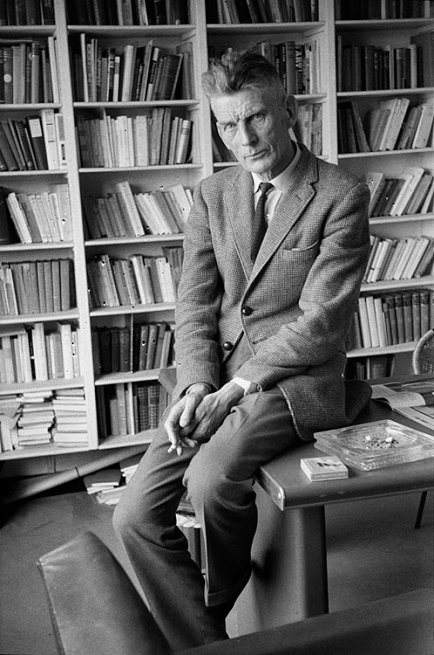Samuel Beckett is a writer who freely uses both languages, English and French, and has sucked in his intellect the rich culture of the two countries in which they are spoken. He became known when he was 47 years thanks to his play "Waiting for Godot" (1953), set on stage at the Babylon Theater in Paris that same year. In 1969 he was awarded the Nobel Prize for Literature. With Ionesco, whose play "The Bald Soprano", which caused a scandal three years earlier, he inspired and led the avant-garde theater, which at first followed the staging of existentialism, and later imposed a new dramatic poetics and a new diagnosis of the condition of man , terminally infected by the omnipresent absurdity. Samuel Barkley Becket was born in the Foxrock suburb of Dublin on April 13, 1906. He is the second son in a wealthy Protestant family. He experiences a happy childhood, marked by the godly piety of his devout mother. He likes the long walks out of nature. From his mother's belief, he will remain anxious and keen to ask questions about the meaning of being, but he does not perceive her religious jealousy. He is a brilliant pupil in the face where he taught hard the French and the Italian language. His intention is to become a professor in Romanesque languages. His favorite sport is rugby.
For the first time, he traveled to France in the summer of 1926 when he visited the lush French Renaissance castles along the Loire valley. In 1928 he was appointed as a lecturer in English at the Ecole Normale Superior on Ulm Street in Paris. For two years, he has often met with an already-exiled Irish writer, James Joyce, with whom he became close friends. In 1931 he returned to Dublin and worked as an assistant at the Trinity College, but soon dropped out of his university career. He revived a deep moral and spiritual crisis in his native country and decided to escape from it. He returned to Paris in early 1932. In 1933, his father died and he returned to Dublin and then settled in London. Despite the spiritual crises and financial turmoil he is experiencing, he ends up in London with his first novel, "Murphy". This humorous and new narrative experiments work was published in London in 1938. At the end of 1936 and the beginning of 1937, he wandered through Nazi Germany and then settled definitively in Paris. From the artistic cafes of Saint-Germain des Pré and Montparnasis, he meets many French writers and poets, Giacometti and the brothers Van Welde come together. On January 7, 1938, an unknown pedestrian stabbed him with a knife in the streets of Paris. He is often visited by a former Ulm girlfriend, Susan Dumneil, who will soon become his wife. He is in Ireland when the Second World War broke out. He immediately returned to France. Later, he admits he preferred to live in a warring France instead of remaining in peaceful Ireland. He participated in the Resistance and would be arrested by the Gestapo for a while. He is a refuge in Voeluz. Then he became an agricultural worker and in the evening wrote "as a therapeutics" his second novel, "Wat". In it he constantly plays with words, with their music, with their power. Here he introduces the figure of a "homeless", which he will often use in his work to mean the fall of man, overcome by his extraordinary humbleness, and by the impossibility of escaping himself.
After the Liberation, he returned to his Parisian apartment and decided to write in French only in the future. In the beginning of 1946 he received, according to his own admission, a "brightening uphill", which he recalled later in his play "The Last Tape". After a long walk, under the influence of the waves, the storm and the light from a coastal lighthouse, he "finally gets the illumination". Everything suddenly becomes clear. "Finally, it became clear to me that the darkness that I continually repelled with fury is in fact my best companion," Beckett writes. At age 40, he has not yet created significant works. There is only one headless chapter in " The Unnamable " to say something. This book takes Beckett in a dead end and the thirteen "Lyrics for nothing" will not be able to get him out of there. Despite the enthusiasm of celebrities such as Tristan Tsara and Roger Blenn, Beckett has to fight to impose his books, it's harder to persuade him to put "Waiting for Godot." His life is rooted. He writes only short texts, plays or stories and translates his works into English. Much of his time during the period 1965-1984 was devoted to his plays and their placement. At first, many theaters refused to put on stage, "Waiting for Godot", but after setting it up in 1953, it gave rise to indescribable success. In 1956 it was first played in New York. This play brings international glory to its creator. It contributes to the greatest extent of his award for the Nobel Prize (1969).

I was young when I watched the video of an old performance of Waiting for Godo. It was performed in a prison, an Irish prison I guess and if I’m not wrong, it was directed or produced by Mr Beckett himself. A very uniqe experience for me. Heve you seen or heared about this one?
Yes, I have only heard about this, it is a famous story and the prisoners like the play a lot. If you have not see this adaptation I recommend it to you. It was very depressing when I watched it for first time:
Thank you... will watch it tonight.
I learned a lot of new things. Good post!
I am glad to hear that :)